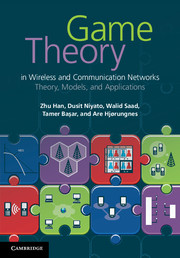Book contents
- Frontmatter
- Contents
- Preface
- 1 Introduction
- 2 Wireless networks: an introduction
- Part I Fundamentals of game theory
- 3 Non-cooperative games
- 4 Bayesian games
- 5 Differential games
- 6 Evolutionary games
- 7 Cooperative games
- 8 Auction theory and mechanism design
- Part II Applications of game theory in communications and networking
- References
- Index
4 - Bayesian games
from Part I - Fundamentals of game theory
Published online by Cambridge University Press: 25 October 2011
- Frontmatter
- Contents
- Preface
- 1 Introduction
- 2 Wireless networks: an introduction
- Part I Fundamentals of game theory
- 3 Non-cooperative games
- 4 Bayesian games
- 5 Differential games
- 6 Evolutionary games
- 7 Cooperative games
- 8 Auction theory and mechanism design
- Part II Applications of game theory in communications and networking
- References
- Index
Summary
The game models discussed in the preceding chapters were all built on the governing assumption that the players all have complete information on the elements of the game, particularly on the action spaces of all players and the players' payoff (or cost) functions, and that this is all common information to all players. However, in many situations, especially in a competitive environment, the a priori information available to a player may not be publicly available to other players. In particular, a player may not have complete information on his opponents' possible actions, strategies, and payoffs. For example, in the latter case, a player may not know the resulting payoff value for another player when all players have picked specific actions (or strategies). One way of addressing situations that arise as a result of such incompleteness of information is to formulate them as Bayesian games—the topic of this chapter. We first introduce this class of games in general terms, and then discuss applications in wireless communications and networking.
Overview of Bayesian games
Simple example
Let us consider the example of a game between two car companies responding to the possibility of a Clean Air Act, such as the one in 1990. If the Act is passed, then both car companies will be faced with the task of redesigning their cars, which will be costly. In order to prevent this from happening, they decide to start a lobbying campaign against the Act.
- Type
- Chapter
- Information
- Game Theory in Wireless and Communication NetworksTheory, Models, and Applications, pp. 101 - 123Publisher: Cambridge University PressPrint publication year: 2011



